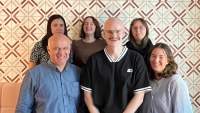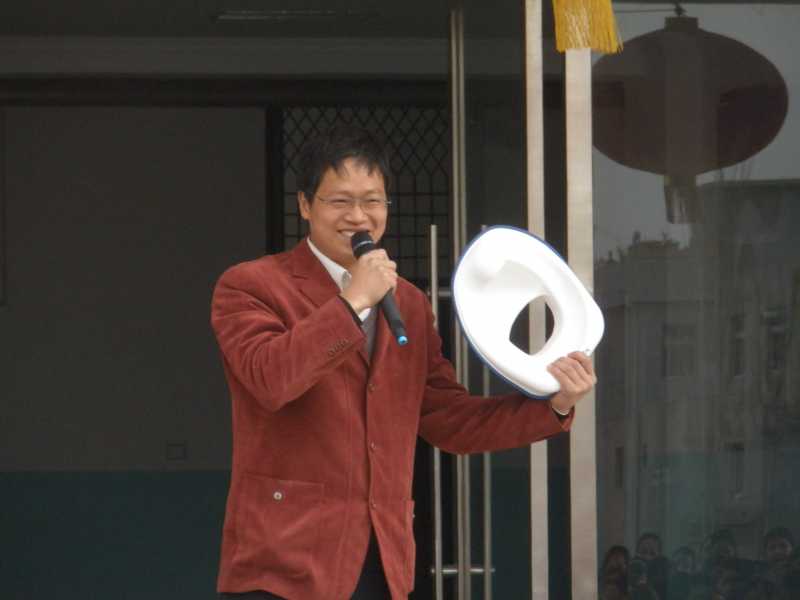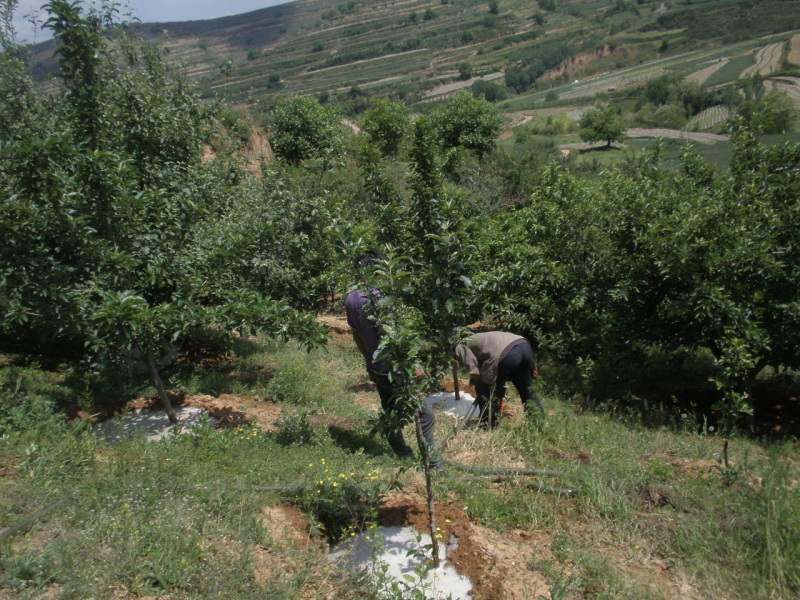- Announcements and miscellaneous
- General announcements
- Featured Users
- Featured User (14) of June 2016: Chen Xiangyang (Scott) from China
Featured User (14) of June 2016: Chen Xiangyang (Scott) from China
25.5k views
Re: Featured User (14) of June 2016: Chen Xiangyang (Scott) from China
The pure urine kept in a closed cement tank for a certain period is harmless to the trees. No single tree has ever been killed by urine. We applied urine to the apple trees every 4 months, especially in March, June and Sept.
I have not add any organic material to the urine so far.
I should have diluted the biogas digestate with water..but it is a little incovenient to do this.
The most popular social media in China is Wechat..which can be used to for Ecosan forum discussion from more Chinese. It takes time and money to have someone to do the transation and I can not afford to do it by myself.
The attchaed namecard can show you that returning the humanwaste or animal manure to the arable land has been our culture for more than 4,000 years. More and more Chinese should be involved in the discusstion of sustainable sanitation methods.
best wishes
Scottt
Chen Xiang Yang, an apple dealer,is growing apples and cherries with the human waste collected from 31 school UDDTs donated by SOHO China Foundation, based in Tianshui City, Gansu Province , China. This email address is being protected from spambots. You need JavaScript enabled to view it., tel:0086 151 9380 3972
Attachments:
-
 APPLE.jpg
(Filesize: 49KB)
APPLE.jpg
(Filesize: 49KB)
Please Log in to join the conversation.
You need to login to replyRe: Featured User (14) of June 2016: Chen Xiangyang (Scott) from China
Please do not worry about the delay. I know that you are very busy.
Thank you for the info on the Cooperl TRAC system for separating the urine and feces of pigs.
Thank you also for the info on how you fertilize the trees. I am surprized that you do not dilute the urine before giving it to the trees. Do you water the trees before or after urine application? Do you apply the urine any time of day, in any weather, at any moment in the annual cycle of the tree?
Maybe dilution could have saved those trees that died sfter application of concentrated biogas digestate. Too much of that slurry killed those trees, but have you ever killed a tree with too much urine?
Have you ever made liquid organic fertilizer by fermenting the urine with other organic materials, like animal manure, weeds, biogas digestate, etc.?
If Google Translate is not good enough to translate into Chinese, what would be a better alternative? Do you think some university would like their students to do this, to learn more about Sustainable Sanitation and to practice their English?
I hope you have great success with your activities.
Best wishes,
Chris Canaday
Omaere Ethnobotanical Park
Puyo, Pastaza, Ecuador, South America
inodoroseco.blogspot.com
Please Log in to join the conversation.
You need to login to replyRe: Featured User (14) of June 2016: Chen Xiangyang (Scott) from China
Sorry. I do not have the experience with biogas reactors. But, I did applied the liquid of the biogas reactor fot the apples trees. The apples taste good but many trees died because I applied too much to the trees. It is a heavy lesson.
FIY. In China, few farmers can afford to raise a pig by themselves. All the biogas reactors built for farmers are sleeping because of the lack of raw material.
best wishes
Scott
Chen Xiang Yang, an apple dealer,is growing apples and cherries with the human waste collected from 31 school UDDTs donated by SOHO China Foundation, based in Tianshui City, Gansu Province , China. This email address is being protected from spambots. You need JavaScript enabled to view it., tel:0086 151 9380 3972
Please Log in to join the conversation.
You need to login to replyRe: Featured User (14) of June 2016: Chen Xiangyang (Scott) from China
Sorry for my late answer to you.
1, To get more Chinese farmers involved in this forum, we need a Chinese version. But, Google is not a good translation tool.
2, As for how I apply the urine to the apple trees, please search Urine Superpowers in www.youtube.com. I just pump the urine out from the shool toilet urine tank, transport it to the orchard ,park the truck in a higher place and apply the urine to the trees one by one.No intelectual properties for applying the urine to the crops since it is a common sense for all Chinese.
3, Cooperl Trac technology for the piggeries
Cooperl started building urine diverting peggeries as shown in the attached file since 2010. Only 3% solid waste is contained in the urine. Quite successul separation, I think.
Did I answer all your questions?
best wishes
Scott
Chen Xiang Yang, an apple dealer,is growing apples and cherries with the human waste collected from 31 school UDDTs donated by SOHO China Foundation, based in Tianshui City, Gansu Province , China. This email address is being protected from spambots. You need JavaScript enabled to view it., tel:0086 151 9380 3972
This message has an attachment file.
Please log in or register to see it.
Please Log in to join the conversation.
You need to login to replyRe: Featured User (14) of June 2016: Chen Xiangyang (Scott) from China
Thanks, Scott, for your answers in Part 3.
It would be great to include more Chinese and others who do not speak English
Would it work for Google Translate to translate Susana posts to various languages and people who speak whichever language could sign up to receive the forum in their preferred language, with the option for these same members to correct the translations whenever they like? If anyone abuses this privilege, it can be taken away.
---Previous paragraph translated into Chinese by Google Translate---
它會為谷歌工作,翻譯成蘇珊娜帖子翻譯成不同的語言和誰講任何語言可以註冊以接收該論壇以他們的首選語言的人,與這些相同的成員選項修正翻譯只要他們喜歡?如果有人濫用這種特權,它可以帶走。
---Same paragraph translated into Spanish. Not perfect, but fully understandable.---
¿Funcionaría de Google Translate para traducir mensajes Susana a varios idiomas y las que hablan el idioma que podría inscribirse para recibir el foro en su idioma preferido, con la opción para estos mismos miembros para corregir las traducciones cuando quieran? Si alguien abusa de este privilegio, que puede ser quitado.
Google might like this idea enough to help set it up.
With respect to Scott's suggestion to involve farmers more, would it be possible for Forum members to help mobilize a system of scholarships for thesis students throughout the world who want to study the application of urine and decomposed feces as fertilizer in agriculture?
Scott, would you mind telling us more about how you fertilize your apple trees? Or are there proprietary issues with protected intellectual property? What problems did you have to overcome?
Best wishes,
Chris Canaday
Omaere Ethnobotanical Park
Puyo, Pastaza, Ecuador, South America
inodoroseco.blogspot.com
Please Log in to join the conversation.
You need to login to reply- secretariat
-
 Topic Author
Topic Author- Moderator
- SuSanA secretariat currently allocates 2 full time person equivalents of time from members of GIZ Sustainable Sanitation Team: Arne Panesar, Alexandra Dubois, Maren Heuvels, Teresa Häberlein, Daphne Manolakos and Bettina-Sophie Heinz.
Re: Featured User (14) of June 2016: Chen Xiangyang (Scott) from China
it is nice to see that Scott's work is being further discussed. Maybe Scott can find the time in a few days to answer the last comments and questions by Chris, in the meanwhile we want to publish the last part of the interview with Scott:
Part 3: About Scott's opinions about the forum
15. Do other farmers also use the forum?
No, in China, I am possibly the only one who is using the forum though I often market the forum website in my social media, Webo and Wechat.
16. Which topics or categories on the forum do you feel most passionate about?
To scale up the Ecosan projects and make it profitable
17. What don’t you like about the forum or about other forum users?
I like everything and everyone in the forum. But, I am too busy to participate the discussion.
18. What is your advice to the forum moderators?
Try to discuss the Ecosan projects that can sustain themselves.
19. What developments are you observing with the discussion forum?
The projects in Africa and India.
20. Which developments do you like, which don’t you like?
It makes me uncomfortable to see Ecosan projects without mentioning the farmers. We need the farmers to get involved to have a better profit. It seems that in the forum, few people are talking about the profitability of the Ecosan projects, which is the most import aspect for all stakeholders.
Thanks again, Scott, for sharing your experiences, visions and pictures with us!
Kind regards,
Raphaela (On behalf of the SuSanA secretariat)
Located at Deutsche Gesellschaft für Internationale Zusammenarbeit (GIZ) GmbH, Bonn, Germany
Follow us on facebook: www.facebook.com/susana.org, linkedin: www.linkedin.com/company/sustainable-sanitation-alliance-susana.
Attachments:
-
 UDDTWerbung.jpg
(Filesize: 23KB)
UDDTWerbung.jpg
(Filesize: 23KB)
-
 Feldarbeit.png
(Filesize: 1,089KB)
Feldarbeit.png
(Filesize: 1,089KB)
Please Log in to join the conversation.
You need to login to replyRe: Featured User (14) of June 2016: Chen Xiangyang (Scott) from China
I searched for Cooperl's TRAC system and there is very little information ... and that little bit contradicts itself. This is likely because they do not want anyone to copy them. In summary, it seems that the urine flows down the sloped floors into buried tanks. The feces apparently get scraped off the floor and some of the sources say they make biogas, others say that they simply dry the feces out to be sold as a soil conditioner.
I like the idea of keeping the urine separate and getting the feces into a biogas reactor as soon as possible, but I think it can be done in a cleaner and more economical way by "house training" the pigs. Dogs and cats get house-trained, so why not pigs? Pigs tend to not deposit at random in their pens, but in certain spots. I suspect the pigs would also prefer their excrement to disappear, if given the chance.
Training could include disagreeable sounds when they miss and treats to eat when they get it right. Designs could be different for males and females.
I think it would be good to combine this with deep bedding, since the pig would be happier and healthier, plus the deep bedding would deal with any "accidents" of feces or urine. The bedding should not have to be changed during the entire life of the pig.
On a separate note, do you have experience with the numerous biogas reactors in China? What economical design would you recommend for processing the feces and stomach contents at a slaughterhouse?
Best wishes,
Chris Canaday
Omaere Ethnobotanical Park
Puyo, Pastaza, Ecuador, South America
inodoroseco.blogspot.com
Please Log in to join the conversation.
You need to login to replyRe: Featured User (14) of June 2016: Chen Xiangyang (Scott) from China
Thank you for your valuable information. Unfortunately, Youtube is not allowed in China. I can not watch theat vedio.
Deep Bedding is not new to us. I was born in central China where we grow rice mainly. Each familiy make a rice straw bed for the pigs and the bufferlo. But now, individual peasants can not affort to raise pigs by themselves because of the high labor cost. Huge pig farms are producing pork of us and they do not use the deep bedding technology which takes a lot of time.
As for the UD peggery, a Frech company, Cooperl, has been working on it since 2010.The system is name TRAC which can separate the urine from solid waste very efficiently.
best wishes
Scott
Chen Xiang Yang, an apple dealer,is growing apples and cherries with the human waste collected from 31 school UDDTs donated by SOHO China Foundation, based in Tianshui City, Gansu Province , China. This email address is being protected from spambots. You need JavaScript enabled to view it., tel:0086 151 9380 3972
Please Log in to join the conversation.
You need to login to replyRe: Featured User (14) of June 2016: Chen Xiangyang (Scott) from China
It is great to learn more about you. I am glad you studied English so now you can share your experiences with us.
I have also thought of making a urine-diverting piggery. Pigs are very intelligent and much cleaner than most people think.
A great existing technology is Deep Bedding for Pigs, where some 50 cm of coarse, dry, organic matter is kept on the floor to absorb the urine, and, since the pig will dig and root, it covers the feces itself. In 6 months, when the pig goes to the slaughterhouse, beautiful soil goes back to the farm. No water is wasted and the river is not affected at all.
www.thepigsite.com/articles/3464/pigs-the-deeplitter-solution/
This could be combined with urine diversion. It may be much easier to do for male pigs, but even if it only works for half of this pigs, this would still be a huge advance.
On a separate note, did you see this new Waterless Urinal design?
inodoroseco.blogspot.com/2015/12/un-nuev...inario-sin-agua.html
It would be very practical to set these up in the schools you work at. Students would mostly need to urinate at school, this keeps the urine entirely separate from feces, and no pumping is needed.
I look forward to seeing more news from you.
Best wishes,
Chris Canaday
Omaere Ethnobotanical Park
Puyo, Pastaza, Ecuador, South America
inodoroseco.blogspot.com
Please Log in to join the conversation.
You need to login to replyRe: Featured User (14) of June 2016: Chen Xiangyang (Scott) from China
Thank you for your comments and encouragment to me. China has the biggest demand for safe food. There is a great space for me to work. I will keep on working to turn the toilet business biggger and bigger with more profits.
Chen Xiang Yang, an apple dealer,is growing apples and cherries with the human waste collected from 31 school UDDTs donated by SOHO China Foundation, based in Tianshui City, Gansu Province , China. This email address is being protected from spambots. You need JavaScript enabled to view it., tel:0086 151 9380 3972
Please Log in to join the conversation.
You need to login to replyRe: Featured User (14) of June 2016: Chen Xiangyang (Scott) from China
secretariat wrote: 13. In the “About me” section in the forum you say “trying to set up the most profitable Ecosan project for the world” – In terms of what do you exactly mean by “profitable”?
It seems that all sustainable projects are not sustainable. All Ecosan projects supported by rich countries have failed in developing countries.
For the sake of my waterless toilets business, I must set up a good example turning the waste into money, telling the world that the toilet is a good product worth to buy.
Very important message, and I hope you will get some challenge to the "most profitable Ecosan project for the world" throne, as right now that is a bit too easy with your project being more or less the only "profitable" one in the world I assume.
Keep up the great work and thanks for taking the time to do this interview!
Please Log in to join the conversation.
You need to login to reply- secretariat
-
 Topic Author
Topic Author- Moderator
- SuSanA secretariat currently allocates 2 full time person equivalents of time from members of GIZ Sustainable Sanitation Team: Arne Panesar, Alexandra Dubois, Maren Heuvels, Teresa Häberlein, Daphne Manolakos and Bettina-Sophie Heinz.
Re: Featured User (14) of June 2016: Chen Xiangyang (Scott) from China
here is part 2 of the interview with Scott. Have fun reading about his interest and thoughts on sanitation!
Part 2: Scott's interests and thoughts on sanitation
11. What do you see as the biggest threats and the biggest opportunities for China’s future? (In terms of sanitation and public health or in general)
The biggest threat is that few Chinese people like UDDTs and they just want to flush and forget.
The biggest opportunity is that there is a heavy demand for organic and safe food. Thus, we can use the demand-driven approach to fulfill the task.
12. What kind of research topics are needed in the sanitation field?
The methods of applying urine to the crops which can bring profits to the stakeholders.
13. In the “About me” section in the forum you say “trying to set up the most profitable Ecosan project for the world” – In terms of what do you exactly mean by “profitable”?
It seems that all sustainable projects are not sustainable. All Ecosan projects supported by rich countries have failed in developing countries.
For the sake of my waterless toilets business, I must set up a good example turning the waste into money, telling the world that the toilet is a good product worth to buy.
14. What would you recommend to youngsters from countries in the global North who want to get involved in development work – how should they go about it? And does it even make sense?
First, the youngsters must bear in mind that the Ecosan business can last forever.
2nd, they should set up a demonstration project growing vegetables with the urine and solid waste so that the potential customer can taste it and buy it. It takes time.
I investigated that even in China, more than 50% of college students would not eat the vegetables if they knew that it were grown with the human waste.
Kind regards,
Raphaela
(On behalf of the SuSanA Secretariat)
Located at Deutsche Gesellschaft für Internationale Zusammenarbeit (GIZ) GmbH, Bonn, Germany
Follow us on facebook: www.facebook.com/susana.org, linkedin: www.linkedin.com/company/sustainable-sanitation-alliance-susana.
Please Log in to join the conversation.
You need to login to reply- Announcements and miscellaneous
- General announcements
- Featured Users
- Featured User (14) of June 2016: Chen Xiangyang (Scott) from China








